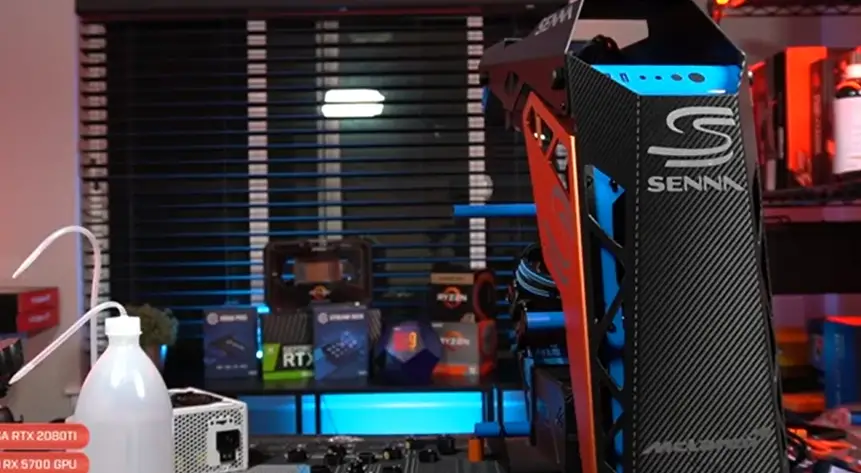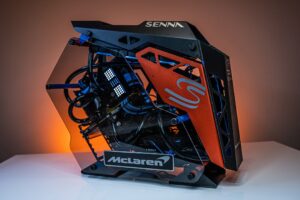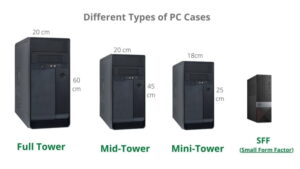HOW TO CHOOSE A PC CASE
Today, the case is a significant part of your PC build. Many people spend hours looking for the perfect case, only to find that what they really want is a different one. It’s easy to get confused when there are so many cases on the market. It is not difficult to purchase a PC case. But it is important to choose the right one for your needs. PC cases are used to hold all of the components in your computer, and they come in different shapes and sizes depending on what you are looking for. So if you have chosen a new PC and need a case, this article will help you make the right choice.Things to consider before buying a PC case:

Build Quality
The first thing you should consider when choosing a computer case is build quality. This refers to the materials used in the construction of your PC, and how well they are designed for their use. Some cases have parts that can be easily damaged by misuse or neglect; others may not last as long because of poor design choices made during production.It’s important to know what type of material was used in constructing your new case so you will understand its durability and sturdiness over time. For example, aluminum cases tend to be more durable than plastic ones although some plastics are harder than other plastics.
Case Size
You will find that there are many different sizes of PC cases. The size is determined by the components you have installed in your computer, and the amount of space they take up. So if you plan to upgrade or add more components, it’s important to choose a case with enough room for everything that you need. The most common types of PC cases are ATX (Advanced Technology Extended), Micro-ATX, and Mini-ITX (Small form factor). They all offer similar features but differ in their dimensions so make sure which one fits your needs before making a purchase decision. The Full Tower PC case is the biggest type of PC case available currently. It’s designed for those who want maximum performance with plenty of cooling options installed inside it. The Mid-Tower style offers a more compact size compared to its bigger brother while keeping all the features that you’re looking for in your new computer systems such as extra power supply units (PSUs), lots of space, and easy access to everything from the top or bottom panels without removing any parts from them – just

Case Style
You will also find a wide variety of PC cases available. They are classified into different styles, and each style has its own advantages and disadvantages. These include the ATX case, which is the most common type; Mini-ITX (Small form factor); Micro-ATX; Full Tower; Mid Tower and finally ITX (Industry Thin Extended). The benefits of these types vary from model to model so make sure you know what they offer before making your final decision on which one to buy. You should look for convenient features like cable management and cooling which we will talk about next.
Cooling
Airflow The amount of airflow in a PC case is very important. An air-flow restriction can cause the components inside your computer to overheat and shorten their lifespan, causing you to replace them sooner than expected. So make sure that there are no restrictive holes or vents in your chosen case, as this may result in an increased temperature within the system which will lead to more frequent component failure. A good way of ensuring adequate cooling is by installing multiple fans on different sides of the chassis so they can provide enough airflow for all devices inside it without having any room left between them for hot air from one device to transfer into another. That’s why you should consider looking at Pc cases that can hold more fan mounts if you want to make a gaming PC as there will be a lot of heat coming out from the Processor and the graphics card. The most common type of PC case is the ATX (Advanced Technology Extended) style. It offers a large amount of space for your components and has plenty of room to install fans, radiators, and other cooling devices. This allows you to make sure that everything will be cooled properly while keeping an eye on the overall system performance. The Micro-ATX case is smaller than its bigger brother but still provides enough space for all your components without having any problems with heat dissipation or noise levels as long as it’s installed correctly. The Mini-ITX (Small form factor) also uses much less space than an ATX case but still has enough room to install a larger motherboard, large CPU cooler, and other components.

Aesthetics
In building a gaming pc, the case is a relatively easy thing to overlook, and there is more to it than just the aesthetics. In fact, the case is the most important part of any PC system, as it protects all your components from damage and will be one of the first things you see when looking at a computer. The overall look and design will also affect how well you’ll feel about using it, so make sure that whatever model you choose suits both your needs and personal preferences. The design of your PC case is a very important factor to consider when you want to purchase a computer case. The size of the case will determine what parts you can install inside it. For example, a Micro-ATX system has less space than an ATX one and so there is usually not enough room for anything larger than a Mini-ITX motherboard. It is entirely up to you to decide which kind of case you find aesthetically pleasing or even whether you care about aesthetics at all. Some people prefer glass because it looks good with RGB lights. Unfortunately, at the moment there are no affordable cases that have glass on all sides. On the other hand, others prefer an all-black exterior, all-white designs, and so on. This is what the gamers are currently looking for.

Conclusion
The PC case you choose can make or break your build. It’s crucial to know how to pick the right one for your needs and budget. There are many options available in the market, and it can be quite confusing when you’re looking for the best one. In this blog post, we have outlined some of the factors that you should consider before buying a PC case, including design, compatibility, size, and other aspects. Let us know in the comments below if you have any questions about this topic!
HOW TO CHOOSE A PC CASE
Today, the case is a significant part of your PC build. Many people spend hours looking for the perfect case, only to find that what they really want is a different one. It’s easy to get confused when there are so many cases on the market. It is not difficult to purchase a PC case. But it is important to choose the right one for your needs. PC cases are used to hold all of the components in your computer, and they come in different shapes and sizes depending on what you are looking for. So if you have chosen a new PC and need a case, this article will help you make the right choice.Things to consider before buying a PC case:

Build Quality
The first thing you should consider when choosing a computer case is build quality. This refers to the materials used in the construction of your PC, and how well they are designed for their use. Some cases have parts that can be easily damaged by misuse or neglect; others may not last as long because of poor design choices made during production.It’s important to know what type of material was used in constructing your new case so you will understand its durability and sturdiness over time. For example, aluminum cases tend to be more durable than plastic ones although some plastics are harder than other plastics.
Case Size
You will find that there are many different sizes of PC cases. The size is determined by the components you have installed in your computer, and the amount of space they take up. So if you plan to upgrade or add more components, it’s important to choose a case with enough room for everything that you need. The most common types of PC cases are ATX (Advanced Technology Extended), Micro-ATX, and Mini-ITX (Small form factor). They all offer similar features but differ in their dimensions so make sure which one fits your needs before making a purchase decision. The Full Tower PC case is the biggest type of PC case available currently. It’s designed for those who want maximum performance with plenty of cooling options installed inside it. The Mid-Tower style offers a more compact size compared to its bigger brother while keeping all the features that you’re looking for in your new computer systems such as extra power supply units (PSUs), lots of space, and easy access to everything from the top or bottom panels without removing any parts from them – just

Case Style
You will also find a wide variety of PC cases available. They are classified into different styles, and each style has its own advantages and disadvantages. These include the ATX case, which is the most common type; Mini-ITX (Small form factor); Micro-ATX; Full Tower; Mid Tower and finally ITX (Industry Thin Extended). The benefits of these types vary from model to model so make sure you know what they offer before making your final decision on which one to buy. You should look for convenient features like cable management and cooling which we will talk about next.
Cooling
Airflow The amount of airflow in a PC case is very important. An air-flow restriction can cause the components inside your computer to overheat and shorten their lifespan, causing you to replace them sooner than expected. So make sure that there are no restrictive holes or vents in your chosen case, as this may result in an increased temperature within the system which will lead to more frequent component failure. A good way of ensuring adequate cooling is by installing multiple fans on different sides of the chassis so they can provide enough airflow for all devices inside it without having any room left between them for hot air from one device to transfer into another. That’s why you should consider looking at Pc cases that can hold more fan mounts if you want to make a gaming PC as there will be a lot of heat coming out from the Processor and the graphics card. The most common type of PC case is the ATX (Advanced Technology Extended) style. It offers a large amount of space for your components and has plenty of room to install fans, radiators, and other cooling devices. This allows you to make sure that everything will be cooled properly while keeping an eye on the overall system performance. The Micro-ATX case is smaller than its bigger brother but still provides enough space for all your components without having any problems with heat dissipation or noise levels as long as it’s installed correctly. The Mini-ITX (Small form factor) also uses much less space than an ATX case but still has enough room to install a larger motherboard, large CPU cooler, and other components.

Aesthetics
In building a gaming pc, the case is a relatively easy thing to overlook, and there is more to it than just the aesthetics. In fact, the case is the most important part of any PC system, as it protects all your components from damage and will be one of the first things you see when looking at a computer. The overall look and design will also affect how well you’ll feel about using it, so make sure that whatever model you choose suits both your needs and personal preferences. The design of your PC case is a very important factor to consider when you want to purchase a computer case. The size of the case will determine what parts you can install inside it. For example, a Micro-ATX system has less space than an ATX one and so there is usually not enough room for anything larger than a Mini-ITX motherboard. It is entirely up to you to decide which kind of case you find aesthetically pleasing or even whether you care about aesthetics at all. Some people prefer glass because it looks good with RGB lights. Unfortunately, at the moment there are no affordable cases that have glass on all sides. On the other hand, others prefer an all-black exterior, all-white designs, and so on. This is what the gamers are currently looking for.

Conclusion
The PC case you choose can make or break your build. It’s crucial to know how to pick the right one for your needs and budget. There are many options available in the market, and it can be quite confusing when you’re looking for the best one. In this blog post, we have outlined some of the factors that you should consider before buying a PC case, including design, compatibility, size, and other aspects. Let us know in the comments below if you have any questions about this topic!




